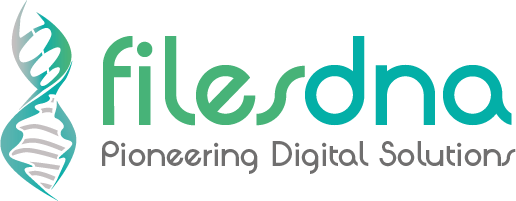Technical Features

Driven by AI/ML and Blockchain
FilesDNA: The Advanced E-Signature Solution
At FilesDNA, we go to great lengths to ensure that your documents are secure and only accessible by the permitted parties. Driven by artificial intelligence, blockchain integration, and machine learning, we use all the tools at our disposal to ensure our advanced e-signature solutions and digital document management systems are secured against fraudulent behavior.
For maximum security, our online document signing services use the Ethereum blockchain. The same technology protects cryptocurrency to encrypt the hash value for each e-document so users can verify the integrity of each signature, making it a bulletproof defense against forgery.
Blockchain integration and encryption is your very own lock and key to all your business files and documents.
FilesDNA
With this technology, users can verify that:
As we move closer to a paperless society, the demand for effective cybersecurity systems and strategies increases exponentially. Sensitive personal data is constantly being transmitted and transferred through the internet, and hackers, bots, and malware could potentially compromise that data.
To prevent your personal data from being compromised, you need a line of defence. Thankfully, just as a computer can be commanded to attack, it can also be used in defence.
At FilesDNA, we place security above all else, so we use all the tools at our disposal to keep your files, signatures, and other personal data under high security. As technology advances, hackers find new exploits and new methods, but we can find new ways to keep you safe online.
The contract looks legalized and all parties have signed
They are looking at the latest reviewed version
The document has not been altered after e-signing
The document is the same (or different) as the previously viewed version
The Future of e-Signatures
Artificial Intelligence and Machine Learning
As we move closer to a digital paperless society, the demand for effective cybersecurity systems and strategies increases exponentially. Sensitive personal data is constantly being transmitted and transferred through the internet. Hackers, bots, and malware could potentially compromise that data.
To prevent your data from being compromised, you need a line of defence. Luckily for you, just as a computer can be commanded to attack, it can also be used in defence.
Here at FilesDNA, we place security above all else, so we use all the tools at our disposal to keep your files, signatures and other personal data under high security. Unfortunately, as technology advances, hackers find new exploits, new methods and new hacks. But with a bit of creativity and know-how, we can find new ways to keep you safe online.
FREE SIGNATURE SOFTWARE
FilesDNA uses artificial intelligence (AI) and machine learning (ML) to learn unique signature parameters and protect its integrity from others who may be trying to copy it
User Verification and the e-Signature Process
We offer a wide variety of security features suitable for any company. With voice recognition, fingerprint identification, AI fraud prevention, passport, and ID verification, along with the best encryption methods at our disposal, we can ensure your documents are safe.
With FilesDNA, you can rest easy knowing that your files are safe and secure with us.
Digital Signatures and E-Signatures
When you have an electronic document that requires a signature, there are going to be two types of signatures on it: digital and electronic. It may sound like these terms are interchangeable, but it’s important to understand the distinction. At FilesDNA, we protect both these signatures.
A Digital Signature
This term refers to the unique identity of the document itself. Encryption services (like blockchain) are used to define the hash value on the document and signal when there is a change so that users will know there has been unverified activity when the hash values of their documents don’t match up.
An Electronic Signature
Also known as an “e-signature”, this is the electronically written signature that is placed on a document to symbolize agreement and a legally bound relation between one or more parties. When an e-signature is placed on a document, that signature is also encrypted for protection. Thus, a unique hash value is created for the e-signature so it can be verified by the individual parties.
Advanced Security Features
We are always on the lookout for new methods to prevent cyber-attacks, forgery, and fraud. When a new technology emerges, new exploits are discovered, and criminals adapt their practices, we do just the same.
Just as criminals can attack via digital means, we can use all the tools at our disposal to secure our software against those who would wish you harm.
Here is how we protect e-signatures with verification processes before signing:
- Smart Signature Pad – An electronic “pen” and “pad” with artificial intelligence and machine learning technologies built in to learn unique signature parameters and reject fraudulent ones.
- Liveness Detection – Our technologies can detect a live person from a bot through the use of biometrics.
- Voice Recognition System – We can capture the unique parameter of a person’s voice to protect their identity and e-signature.
- ID and Passport Verification System – Scan and save your official government documents to prove your identity and protect it from being stolen
- Fingerprint – Sign documents with your unique fingerprint.
- Email and Mobile Number – Verify your identity by communicating with our system through email and/or mobile phone.
- Near Field Communication (NFC) Tag – Each verified user will have their own NFC Tag that is linked to their account. They can use the NFC when they open/edit the document or when they create/add their signature to any document. The NFC adds another security layer to two-factor authentication processes.
Innovation to the core: the application of artificial intelligence
At FilesDNA, we utilize innovative cutting-edge technology to prevent fraud, forgery, and other criminal behavior. To adapt to this ever-changing technological age, we have created the Smart Signature Pad. The Smart Signature Pad uses artificial intelligence and machine learning to ‘learn’ your unique signature parameters so it can reject forged and invalid signatures.
It is also designed to bring the sensation and accuracy of writing with a real pen, allowing you to sign digitized documents as though they were paper. Enjoy our unique and secure method of signing all your business documents with a whish of your wireless pen.
What Makes FilesDNA Unique?
We have our Smart Signature Pad that you can use to add your signature with a wireless pen; This gives you the same feeling and accuracy as signing on real paper and makes forgery difficult as we employ artificial intelligence and machine learning technology to learn and secure your signature.






